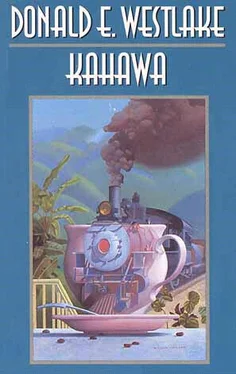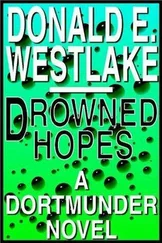* * *
The three messages were from: Captain Baron Chase, signing himself “Deputy Chief of Protocol,” welcoming Sir Denis to Uganda and inviting him to a reception with President for Life Idi Amin Dada in the president’s suite, 202, at five this afternoon; from his daughter, Anne, now thirty-eight and married to a banker in the City, asking him, should he return through London on his way back to Brazil, to call her and to bring her an African woven rush bag; and from Carlo Velhez, of the Brazilian Coffee Institute, saying he was in Room 417.
Having unpacked and showered and made shorthand notations about the day thus far in his diary—seventeen volumes of this dull stuffy material in crabbed private code were now stored in London and Sussex and São Paulo—Sir Denis phoned Velhez and invited him to the room for a pre-reception conference.
Whisky and safe water were already in the room. Sir Denis downed a short neat whisky, and had the glass washed and dried and back on the tray atop the dresser before the small economical rapping at the door introduced the small economical person of Carlo Velhez, a tiny dapper man incongruously kitted out with a great flowering bandit’s moustache. In Brazil, Sir Denis and Velhez were matter-of-fact with one another, not close socially or personally, indifferent to one another’s presence or absence; here, in the usual manner of travelers meeting far from home, they were nearly brothers, reacting with honest pleasure to the encounter.
“Come in, come in.”
“You’re looking well.”
“Pleasant flight?”
“Odd place, this.”
They then sat down with light whisky-and-waters to discuss the purpose of their being here, speaking together in Portuguese, which infuriated the State Research Bureau men in their basement listening post.
“There is some question of money,” Velhez said.
“But the price was determined last month.”
Velhez nodded, manicured fingers toying with his alarming moustache. “Nevertheless,” he said, “the price continues to rise in the commodity markets.”
Outrage at human inconstancy had long since faded in Sir Denis to pragmatic weariness; one dealt with the human race not as it should be but as it was. Still, he pointed out the obvious: “The agreed-on price is the agreed-on price. If the market went down, would the Ugandans expect to receive less?”
“They have been given that argument,” Velhez said drily. “But in fact I think this is only a negotiating step.”
Sir Denis observed the pale liquid in the bottom of his glass. “Of course. They don’t want more money, they want something else. Some change in the shipping arrangements?”
“No. We—that is, the consortium—are still to provide eight planes to transship the coffee to the steamers at Djibouti.” Velhez smiled sadly beneath the moustache. “What they want is a larger percentage in advance.”
“How much?”
“One third.”
Looking and feeling astonished, Sir Denis said, “Twelve million dollars? In advance?”
“I have it from Baron Chase himself,” Velhez said. “That’s what they’ll want, and they won’t back down from it. In fact, they’d prefer the suggestion to come from us.”
“Baron Chase. Captain Baron Chase.” Sir Denis crossed the room to pick up his messages from the bedside table. “Deputy Chief of Protocol,” he read, and looked at Velhez. “Who is this chap?”
“Canadian. Working—”
“A white man?”
The Velhez moustache quivered in amusement. “Exactly so. He may have taken up Ugandan citizenship.”
“Captain,” Sir Denis repeated. “Captain of what?”
“Apparently, Amin wanted him to call himself General,” Velhez explained, “but Chase has a finer sense of the ridiculous than Amin, and they compromised at Captain.”
“What does he do? Is he important?”
Velhez shrugged. “With one-man rule, it’s hard to say who is or is not important. But Amin has two or three of these whites to advise him, to smooth the way for him internationally, to act for him where his own Nubians would make a botch of things. Chase is ubiquitous.”
“I must have a word with him, then,” Sir Denis said. “One third in advance. What if, after all, the rains come inopportunely and ruin the crop? What if this government falls? Governments have been known to fall.”
“So has rain,” Velhez agreed. “So has frost, as we both well know.”
Sir Denis frowned. “Has Bogotá been informed?” He was referring to the Bogotá Group, the OPEC of coffee, a combine of eight Western Hemisphere producers: Mexico, Brazil, Venezuela, Colombia, El Salvador, Costa Rica, Honduras, and Guatemala. They had approved the original deal.
But Velhez merely shrugged, saying, “It doesn’t concern them, so long as the final price doesn’t change.”
“Well, I don’t believe,” Sir Denis said slowly, “that Emil Grossbarger will stand for it.”
At that, Velhez looked doubly worried, as well he might. Although the actual coffee sale was being conducted between governments—sold by the official Uganda Coffee Commission and bought by the quasi-governmental Brazilian Coffee Institute—there was an inevitable middleman, in this case a venture capital group from London and Zurich headed by a Swiss named Emil Grossbarger. The shipping of the coffee, its delivery to the Brazilians’ customers, and the collection and disbursement of moneys, would be in the charge of this private consortium, which had both the capital and the clout in the international financial community to guarantee delivery and honesty. If the Grossbarger group were to bow out now, if Brazil had to start all over and negotiate for coffee elsewhere to fulfill its commitments, the price would certainly be higher, the availability of sufficient product would be very much in doubt, and Brazil might well find itself going into the next coffee season with its new crop already committed to past debts. “Don’t you think,” Velhez asked, unable to hide his anxiety, “you could talk to Grossbarger? Persuade him?”
“I’m not certain it would be honorable to make the attempt,” Sir Denis said somewhat primly. “Grossbarger came to the ICB because we are known to be neutral in such matters.”
The ICB, the International Coffee Board, was a London-based organization supported by the coffee industry and endorsed by the governments of both the producer and the consumer nations, with the task of dispassionately overseeing the international coffee trade. Sir Denis, an expert with the ICB for the last seventeen years, a man who moved massive shipments of coffee around the world in a great endless obscure game of Go, and whose special relationship was with the Bogotá Group and particularly the Brazilian Coffee Institute, had at Emil Grossbarger’s personal request handled the negotiations among the various parties to the current sale. So far he had done the work in London or São Paulo, but now that the pact was about to be signed he had come here to Kampala for the final formalities.
Where an immediate snag had appeared. The agreement, as Sir Denis very well remembered, was for an initial payment of one tenth, or approximately three and a half million dollars U.S., of which the Brazilians and the Grossbarger group would each put up hall. Now, at the last minute, this down payment was to be very nearly quadrupled. After pausing to give himself and Velhez another pair of drinks—and allow Velhez to recapture his composure—Sir Denis said, “Emil Grossbarger is simply not a man to toy with.”
“I’m sure,” Velhez said, “something can be done. There’s certainly goodwill on all sides.”
“One third?”
“Uganda, I understand, has foreign-exchange problems.” Velhez tried to shrug away Uganda’s political mess. “The closing of borders and so on. One can understand their position.”
Читать дальше












